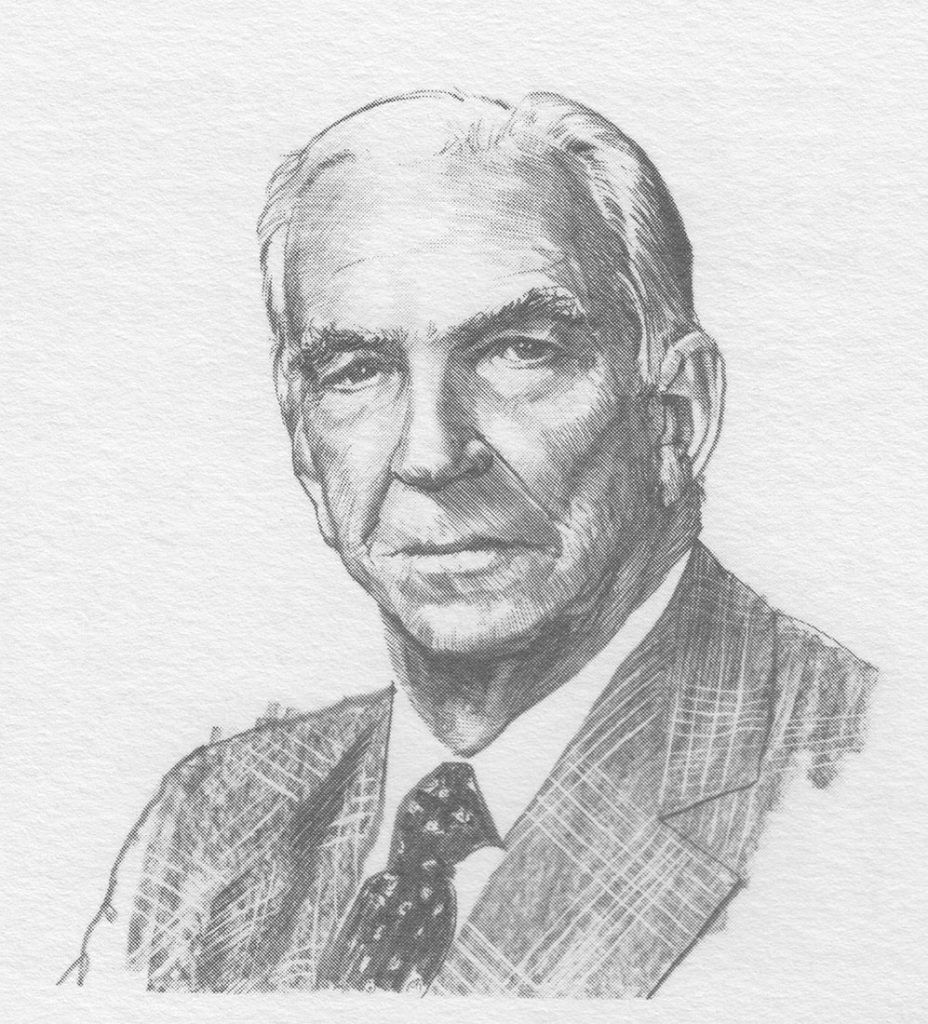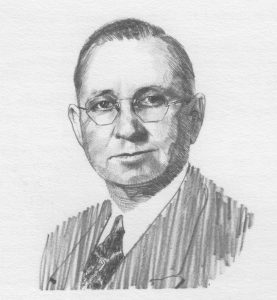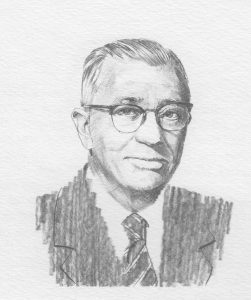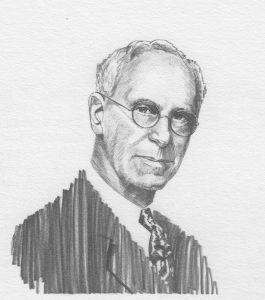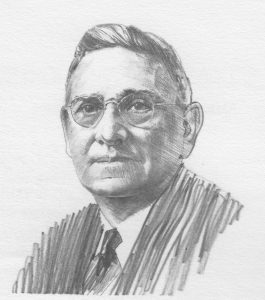Thomas Dameron Russell, one of the first two living inductees to the Alabama Business Hall of Fame, carries forward an illustrious name in the history of the textile industry in the South.
That history is so intertwined with the Russell family of Alexander City as to be almost inseparable.
Tom Russell was born in 1903 in Alexander City, the second son of Benjamin Russell and Roberta McDonald Russell.
Benjamin Russell founded Russell Mills in 1902 and his three sons and daughter grew up during the pioneer days of the firm. The three boys all finished high school in Alexander City, working summers in almost every job connected with the family business, and then going on to The University of Alabama before returning to take a place beside their father.
Tom Russell completed his college work in 1925, and after a short tour of Europe became purchasing agent for Russell Mills and assistant to his father. The assistant’s title carried broad duties, and Russell remembers well that his father had him doing many things: unloading bricks, lime, and mortar and performing any other duty that needed doing. He worked in the mornings in the mill office and in the afternoons in the spinning mill.
By 1926, Tom Russell had been appointed Vice-President of the Russell Foundry, serving as general manager of this operation until 1941. In the 1930s, he along with his brothers, Benjamin Commander Russell and Robert Alston Russell, became Vice-Presidents of the Russell Manufacturing Company. Later his sister, Elisabeth Russell Alison, was also appointed as a Vice-President. In December of 1941, shortly after the opening of the Second World War, their father’s long and fruitful life ended. Tom Russell became President of Russell Foundry, and his brother Ben succeeded their father as President of the Russell Manufacturing Company. Under this administration, the company continued to expand to meet the nation’s military needs during the Second World War. The Russell Mills responded magnificently, and clothing flowed in ever-increasing quantities to the Armed Forces.
The war years wore heavily on Ben Russell, an excellent leader of men. In late 1944-45, he became ill and in January 1945, he died. Tom Russell became President of the company. Russell moved into a very difficult situation. With war’s end, a tremendous increase in demand for textiles ensued, taxes were lowered, and manpower returned from the front. To the casual observer, it would have seemed a heyday for the textile manufacturing industry, but inherent problems also existed. During the war, it was impossible to obtain new machinery or to repair worn-out machinery. Thus, it was necessary for Russell to head a program of expansion, replacement, and modernization. The company expanded rapidly: new buildings were built, additional machinery was added, and existing machinery repaired, but the boom which had been caused by the end of the war also came to an end in late 1948. Low-profit margins brought the realization that the bonanza of orders and profits was not a built-in fixture of the textile industry. Conditions forced a re-examination of the position of the company and production methods. Efficiency had to be improved, economies affected across the board, new methods employed, and labor-saving machinery located and installed.
Tom Russell more than met the challenge. The company continued profitably and was in excellent shape to meet the emergency of the Korean conflict. War’s end again brought new problems. Prices hit new lows, demand for textiles dropped disastrously, inventories continued to build to almost an all-time high, and again it was time to make a very critical self-examination of production, sales, and expenses.
Another specter soon appeared in the form of competition from foreign countries. Textile products from the Far East, aided by the liberal tariff policy of the government, posed a serious threat to the American textile industry. Again Russell Mills responded by refusing to pile up excess inventories which would weaken the price structure and by introducing newer, more competitive technology.
As the years turned to decades, Tom Russell met all challenges squarely. The company continued to grow and Russell moved from the Presidency to the Chairman of the Board of an incorporated Russell Corporation.
This story could end here and be an outstanding chronicle of success, but the story of Tom Russell is a story of far more than success in business. His accomplishments outside the field of Russell Corporation, within the community, and the section at large, are legion. He can count memberships on the board, or chairmanships of the board, or positions as president or director of more than two score corporations or associations. In addition, he has served as a member of the board of trustees of four separate educational establishments and has been honored as a member of Omicron Delta Kappa and Phi Psi. He is a recipient of the William Crawford Gorgas Award, a member of the Alabama Academy of Honor, and recipient of the honorary degree of the Doctor of Laws from his alma mater, The University of Alabama.
But even more, Tom Russell and his wife, Julia, understanding fully that axiom of Thomas Jefferson that “Religion, morality, and knowledge being necessary to good government and the happiness of mankind, schools and the means of education shall forever be encouraged,” have worked tirelessly over the decades to aid education toward the general well-being of their fellow citizens. As a recognition of the debt owed by the institutions of higher learning to Russell and his wife, college buildings located at Samford University, Alexander City Junior College, and Tuskegee Institute have been named for Thomas D. Russell and buildings at The University of Alabama and the University of Alabama in Birmingham have been named for Thomas D. and Julia Russell. Probably no private citizen within Alabama has had his name attached to as many buildings of institutions of higher learning as has Thomas D. Russell.
Three-quarters of a century has passed since the meager beginnings of the Russell Manufacturing Corporation. Over the years that company has dealt fairly and honestly with its customers and those who worked for it. This company, through good stewardship, has been run for the benefit of its employees, the community, and the state in which it is located. Nearly twenty years ago, Thomas Russell, in telling the story of Benjamin Russell and the Russell Manufacturing Company, stated:
The Russell family has had a heritage of public trust and responsibility to uphold. Many calls are made for its members to assume duties in many phases of activity: civic, social, and business. The members of this family have always lived up to their obligations and have taken on many jobs in civic organizations and business associations and in education.
Thomas Russell has more than lived up to that heritage and responsibility in the civic, social, business, and educational fields. He has been a giant among men in his generation.
NOTE: Portions of this biography are extracted from, “Russell of Alabama,” Thomas D. Russell, the Newcomen Society in North America.

